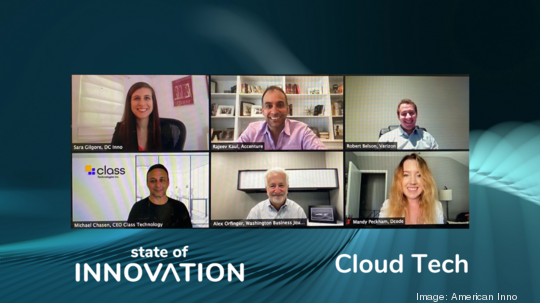
Covid-19 drove businesses of all sizes to the cloud, speeding up implementation of technology that otherwise could have taken years for many to adopt — and forever changing how it operates.
That was the key takeaway from DC Inno’s State of Innovation panel May 19, where industry executives discussed the pandemic’s impact on the industry and where it goes from here with moderator Mandy Peckham, director of growth and client engagement for Dcode.
The shift to remote work in early 2020 forced companies to figure out overnight how to function in a virtual world, get products and services out to market fast “and showed, even for these larger enterprises, what can be done” with the cloud, said Rajeev Kaul, managing director and U.S. south head of cloud and software engineering for Accenture, which sponsored the event.
Rapid uptake yields opportunities, new ideas
The speed of that uptake applied not just to organizations moving to the cloud, but also “everything surrounding the cloud that has evolved with it,” such as the point-of-sale hardware that’s used for contactless checkout and how that evolves in the future, said Robert Belson, who focuses on cloud programs for Verizon’s corporate strategy group.
That fast execution proved vital for standing up registration systems for vaccine distribution and unemployment benefits. The cloud’s increased security and responsiveness that made that possible also provides “an experience people now demand and expect when they’re looking for commercial services from public sector organizations,” said Dominic Delmolino, vice president for technology and innovation for Amazon Web Services’ worldwide public sector.
The moment also saw the birth of new businesses altogether. Take Class Technologies, a startup Blackboard co-founder Michael Chasen launched at the peak of coronavirus, which is built on top of the Zoom platform to help teachers educate their students remotely.
“The cloud infrastructure really had to operate at a scale far beyond what anybody had imagined, in a relatively quick period of time. And the success of Zoom and the other online meeting tools, the fact that they were able to scale with such degree, shows the power of cloud computing,” said Chasen, CEO of Class Technologies, also a 2020 Startup to Watch. His company increased usage 1,000% with hundreds of thousands of teachers and millions of students continuing school online — thanks to cloud tech, he said. “That’s the type of scalability that wouldn’t have been possible if these were independent, localized systems,” he added.
Covid helped many get cloud-comfortable
The cloud space will soon see another shift as people return to the workplace — but now, with the recognition that high accessibility and high security are possible, Delmolino said. “We’ve seen a three-to-five-year speed-up in what is now an expectation around digital access.”
The change will require employers to think about talent and company culture as they look to maximize the value of cloud, the panelists said. Adoption of the technology itself “really does need to become part of that core culture of how you bring employees on board and how you train them up to do their jobs,” Chasen said.
That culture component becomes more important going forward because “cloud is moving faster than ever,” said Belson. And that means all businesses — from early-stage startups to mature corporations — can’t ignore the power and potential of cloud and the networks that make it tick. “As organizations think about their overall cloud strategy, they ought to consider where 5G networks and the mobile edge plays in their strategy in order to drive those ultra-immersive experiences, those contactless experiences, and how we live in this post-Covid world," he said.
Going forward, cloud will see developers and startups build more and more applications on top of its first-level infrastructure, Chasen said. It will gain recognition for its environmental benefits in reducing the carbon footprint, and for its ability to provide more security so companies can instead focus on innovation, said Delmolino of AWS. And as with terms like “internet” that are now ubiquitous, “that’s what we’re going to see in the next few years with this word, ‘cloud’ — it’s just going to be the fabric of everything,” Kaul said during the discussion.
Chasen: Tech companies will build on this moment
It all paves the way for more creativity, development and disruption, Chasen said. “The innovation that you’re going to see coming off of cloud technologies in the next two years, or quite frankly, even one year, I think, is going to surpass all of the innovation we’ve seen over the last decade.”
It’s already underway. A growing group of D.C.-area startups are developing cloud technologies, from Reston's ScienceLogic, whose products allow customers to monitor applications and systems across their networks, to Sterling’s ParkMyCloud, whose platform helps companies get rid of wasted cloud spend.
The roster also includes Tysons analytics startup Qrvey, National Harbor IT company Cloudforce and Rockville’s CloudBolt Software, as well as companies scooping up cloud assets: Hollywood, Maryland-based Smartronix acquired Herndon’s C2S Consulting Group to grow its cloud business unit just this week; Rockville’s Infinite Computer Solutions bought IBM’s cloud-based talent management software unit earlier this year; and Vienna’s 10Pearls purchased San Francisco’s Zen Cloud Technologies in 2020.
It comprises early-stage startups across industries now adopting cloud tech and implementing cloud capability, such as D.C.’s iCE Neurosystems, and those that stand to benefit from their customers’ adoptions of cloud environments, such as the District’s Sorcero. And there’s plenty more where that came from.
Check out the full conversation below:




